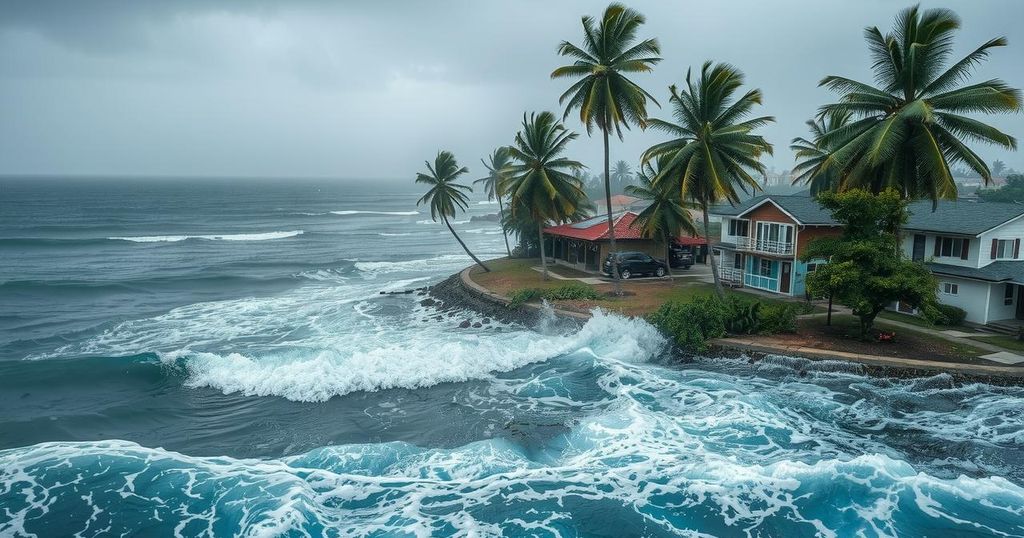Cyclone Chido: Devastation in Mozambique Leaves 94 Dead and Thousands Affected
Cyclone Chido has killed 94 people in Mozambique, injured 768, and affected over 622,000 since its landfall on December 15. The cyclone also damaged educational and health facilities, exacerbating the humanitarian crisis. The government is mobilizing assistance to affected areas, while recovery efforts continue in the wake of this catastrophic storm.
Cyclone Chido has devastated Mozambique, resulting in the tragic loss of 94 lives since making landfall last week. Local reports from the National Institute of Risk and Disaster Management (INGD) indicate that 768 individuals sustained injuries, while over 622,000 have been impacted by the disaster. The cyclone struck on December 15, bringing winds reaching 260 km/h (160 mph) and 250mm of rainfall within the initial 24 hours.
Chido had initially caused destruction on the French Indian Ocean territory of Mayotte before proceeding to Mozambique, Malawi, and Zimbabwe. In Mozambique, the cyclone hit the northern provinces, particularly affecting Cabo Delgado and moving inland to Niassa and Nampula. The INGD reported detrimental effects on both the education and health sectors, with over 109,793 students losing access to their schools due to significant infrastructure damage. Furthermore, 52 health facilities were impacted, increasing the risk of diminished access to essential healthcare services, particularly in already vulnerable areas.
In response, Daniel Chapo, leader of Mozambique’s ruling party, declared that the government is mobilizing support at all levels. During his visit to Cabo Delgado, one of the areas most severely affected, Mr. Chapo emphasized collaborative efforts with the INGD to assist affected residents in the provinces of Mecúfi, Nampula, Memba, and Niassa in their recovery. In Mayotte, Cyclone Chido was described as the worst storm to hit the archipelago in 90 years, prompting concerns over a significant rise in the death toll, which currently stands at 35 according to updates from the interior ministry.
Presently, more than 1,300 officers have been dispatched to aid the local population. As recovery efforts progress, many residents remain without basic necessities, with reports indicating that running water is gradually being restored in Mayotte’s capital. Daily shipments of equipment totaling around 100 tonnes are being sent to the region, supported by an air bridge connecting Mayotte, Reunion, and mainland France. The interior minister reported that 80 tonnes of food and 50 tonnes of water had been distributed on one occasion.
The characteristics of tropical cyclones, including high winds, heavy precipitation, and storm surges, often lead to extensive damage and flooding. The INGD stated that the impact of Cyclone Chido underscores the ongoing vulnerability of social infrastructure to climate change, highlighting the urgent necessity for resilient planning to mitigate future disasters. The Intergovernmental Panel on Climate Change (IPCC) has noted a strong correlation between human activity and increased precipitation from tropical cyclones, along with a medium level of confidence regarding the heightened intensity of these storms due to climate change.
Cyclone Chido represents a significant natural disaster event, illustrating the increasing frequency and intensity of such weather phenomena attributed to climate change. The cyclone not only impacted Mozambique with tragic human and infrastructural costs but also previously affected the French territory of Mayotte, raising alarms there about possible long-term consequences. Understanding these cyclones in the context of climate science highlights the critical need for effective disaster management and climate resilience strategies. The patterns of destruction and the ensuing challenges following such natural disasters are indicative of broader ecological and social vulnerabilities that nations face today, particularly in regions prone to cyclones.
Cyclone Chido has had a devastating impact on Mozambique, resulting in fatalities, injuries, and widespread disruption to essential services. The governmental response underscores the need for effective mobilization and recovery strategies in the wake of natural disasters. Moreover, the situation serves as a stark reminder of the vulnerabilities posed by climate change, necessitating urgent action to bolster resilience and preparedness against future cyclones. The incident calls for enhancing infrastructure and disaster management protocols to protect affected communities and prevent similar tragedies in the future.
Original Source: www.bbc.com




Post Comment